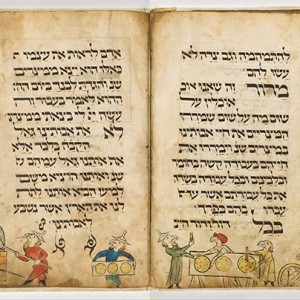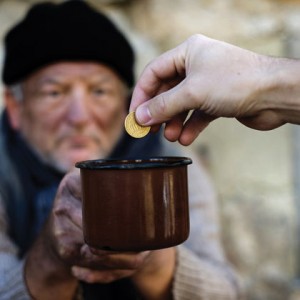

In the words of King Solomon, “A good name is to be chosen rather than great riches…” (Prov. 22:1). Names represent so much more than just a label by which we identify people, places or things. They bring with them memories, both good and bad; they represent our various roles in the lives of others;
Continue Reading »
Recently my wife, Robbie, and I stopped to order takeaway on our way home one evening. While we were waiting for our burgers, the young rabbi working at the counter engaged us in conversation. He asked us where we were from and we told him we lived in the neighborhood. “How long do you plan
Continue Reading »
Have you heard of the Feast of Ingathering? It is another, less common name for Sukkot or the Feast of Tabernacles which is described in Exodus 23:14–17: “Three times you shall keep a feast to Me in the year: You shall keep the Feast of Unleavened Bread (you shall eat unleavened bread seven days, as
Continue Reading »
When walking about the bustling streets of Jerusalem, it is common to hear someone say “slichah” as they bump into you or ask you to move out of the way. In modern English, the Hebrew word “slichah” (slee-CHA, סליחה) is translated “excuse me” or “pardon me.” When the word slichah is used in the Tanakh
Continue Reading »
Freedom every 50 years! Debt is canceled, property returned to the original owner and slaves are set free! No more bondage for anyone. Even the land received a break from sowing, cultivating and reaping. This is the amazing concept of freedom, liberty and maintaining justice that God established with the Jubilee Year. Every fiftieth year
Continue Reading »
“And you shall tell your son in that day [when the Lord brings you into the land which He promised to give you], saying ‘This is done because of what the Lord did for me when I came up from Egypt’” (Exod. 13:8 emphasis added). The word haggadah (הגדה), which is the noun form of
Continue Reading »
The sight of a Japanese friend, standing at the stove cooking with long wooden chopsticks, brought back memories of my own Japanese grandmother. She would also stand at her big stove with chopsticks and deftly pluck tempura vegetables out of a pot of hot oil…like a chopstick ballet. She immigrated to Canada from Okinawa at
Continue Reading »
{image_1}“In the beginning God created the heavens and the earth…Then God saw everything that He had made, and indeed it was very good” (Gen. 1:1, 31). In love, God created a perfect world. He created man in His own image (Gen. 1:27), and in the beginning there was perfect communion, a whole relationship between God and His creation. Then sin and darkness entered the world. After the story of the Fall in Genesis 3, mankind was in desperate need of returning or being restored to the perfection Adam and Eve had enjoyed at the beginning.
Continue Reading »
{image_1}The word tzedakah appears 157 times in the Scriptures. It comes from the Hebrew root tzedek which means righteousness, fairness or justice. The word tzadik comes from this same root and is an adjective used to describe a truly righteous person. Tzedakah literally, then, means justice or righteousness. In Judaism, it refers to the religious obligation to do what is right and just and is seen, as it is in Christianity, as a foundational requirement of living a godly life.
Continue Reading »
{image_1}Scripture is rife with verses that graphically and beautifully describe the Father’s love for His people, flowing out of a heart of passion and guaranteed by eternal faithfulness. One of my favorites is Isaiah 49:16, “See, I have inscribed you on the palms of My hands; your walls are continually before me.” Since the sentence begins with the Hebrew word hine, or “listen up” as we might say in English, we can know that the ensuing message is particularly important. However, what follows is as mysterious as it is poetic. So, as lovely as these words are at first blush, we might want to ask what they really mean.
Continue Reading »All logos and trademarks in this site are property of their respective owner. All other materials are property of Bridges for Peace. Copyright © 2025.
Website Site Design by J-Town Internet Services Ltd. - Based in Jerusalem and Serving the World.